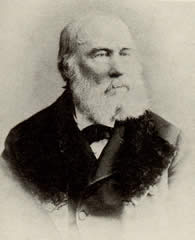Walter Hood Fitch (28 February 1817 – 1892) was a botanical illustrator, born in Glasgow, Scotland, who executed some 10,000 drawings for various publications.[1] His work in colour lithograph, including 2700 illustrations for Curtis's Botanical Magazine, produced up to 200 plates per year.[2][3][4][5]

Biography edit
Fitch was involved in fabric printing from the age of 17 and took to botanical art after meeting William Jackson Hooker, Regius Professor of Botany, a competent botanical illustrator, and the editor of Curtis's Botanical Magazine. Fitch's first lithograph of Mimulus roseus[6] appeared in the Botanical Magazine in 1834, and he soon became its sole artist. In 1841 W.J. Hooker became director of Royal Botanic Gardens, Kew and Fitch moved to London. After 1841 Fitch was the sole artist for all official and unofficial publications issued by Kew; his work was paid for by Hooker personally. It was not unusual for him to work on several different publications simultaneously; he could draw directly onto the lithographic stone to save time. These chromolithographs were based on botanical illustrations provided by Hooker and others, and produced some of his most spectacular results.[7]
Fitch's important works include his illustrations for William Hooker's A century of orchidaceous plants[8] (1849), and for James Bateman's A Monograph of Odontoglossum[9] (1864–74). He also created around 500 plates for Hooker's Icones Plantarum (1836–76) and four lithographic plates for the monograph Victoria Regia.[10] The latter work received critical acclaim in the Athenaeum, "they are accurate, and they are beautiful".[11]
Other works were for George Bentham's Handbook of the British Flora[12] (1858, later editions edited by Joseph Dalton Hooker). When J. D, Hooker returned from his travels in India, Fitch prepared lithographs from Hooker's sketches for his Rhododendrons of Sikkim Himalaya[13] (1849–51) and, from the drawings of Indian artists, for his Illustrations of Himalayan Plants[14] (1855). He also produced the illustrations presented in the younger Hooker's The Botany of the Antarctic Voyage, consisting of six volumes covering the flora of the Antarctic, New Zealand, Tasmania, and outlying islands collected on the Ross expedition of 1839 to 1843.[3]
A dispute over pay with J. D. Hooker ended Fitch's service to both the Botanical Magazine and Kew in 1877. He was much sought after and remained active as a botanical artist until 1888. Works during this period included Henry John Elwes's Monograph of the Genus Lilium[15] (1877–80). His renown as a botanical illustrator was such that his obituary in Nature stated "... his reputation was so high and so world-wide that it is unnecessary to say much on this point."[16]
The standard author abbreviation Fitch is used to indicate this individual as the author when citing a botanical name.[17][18] Fitch was made a fellow of the Linnean Society in 1857.[1] He died 14 January 1892 and is buried in Richmond Old Cemetery together with his wife Hannah (died 13 March 1929).[5]
The genus Fitchia is named for him.
His nephew, John Nugent Fitch (1840 – 1927), also produced illustrations for Curtis's Botanical Magazine.
-
Plate 2, Victoria amazonica, of Victoria Regia, 1851
References edit
- ^ a b Lewis, Jan. "Fitch, Walter Hood (1817–1892)". Oxford Dictionary of National Biography (online ed.). Oxford University Press. doi:10.1093/ref:odnb/54090. (Subscription or UK public library membership required.)
- ^ "Walter Hood Fitch (1817-1892)". Kew, History & Heritage. Royal Botanic Gardens, Kew. Archived from the original on 29 January 2009. Retrieved 3 April 2009.
- ^ a b "Fitch, Walter Hood (1817 - 1892)". Collectors & Illustrators. Australian National Herbarium. Retrieved 29 March 2009.
- ^ Botting, Hemsley, W. (1915). "Walter Hood Fitch, Botanical Artist, 1817-1892". Bulletin of Miscellaneous Information (Royal Botanic Gardens, Kew). 1915 (6): 277–284. doi:10.2307/4104572. JSTOR 4104572.
{{cite journal}}: CS1 maint: multiple names: authors list (link) - ^ a b "Walter Hood Fitch". Journal of Botany. 30 (1161): 100–102. 1892. Bibcode:1892Natur..45Q.302.. doi:10.1038/045302a0 – via biodiversitylibrary.
- ^ "Mimulus roseus. Rose-coloured Monkey-flower". Curtis's Botanical Magazine. VIII: Plate 3353. 1834.
- ^ "Plants and Gardens portrayed". LuEsther T. Mertz Library. The New York Botanical Garden. Retrieved 29 March 2009.
- ^ Hooker, William Jackson (1849). A century of orchidaceous plants selected from Curtis's botanical magazine : consisting of a hundred of those most worthy of cultivation. Reeve, Benham, and Reeve.
- ^ Bateman, James (1874). A monograph of odontoglossum. L. Reeve. Retrieved 21 April 2017.
- ^ Hooker, Sir W. J. (1851). Victoria Regia : or, Illustrations of the Royal water-lily, in a series of figures chiefly made from specimens flowering at Syon and at Kew. Illustrated by Walter Fitch. London: Reeve brothers.
- ^ Allibone, Samuel Austin (1863). A critical dictionary of English literature and British and American authors. Vol. 1. George W. Childs.
- ^ Bentham, George (1858). Handbook of the British flora: a description of the flowering plants and ferns indigenous to, or naturalized in, the British Isles. London: Reeve.
- ^ Hooker, Joseph Dalton (1849), Hooker, William Jackson (ed.), The rhododendrons of Sikkim-Himalaya : being an account, botanical and geographical, of the rhododendrons recently discovered in the mountains of Eastern Himalaya, London: Reeve, Benham, and Reeve
- ^ Hooker, Joseph Dalton; Cathcart, John Fergusson (1855). Illustrations of Himalayan plants: chiefly selected from drawings made for the late J.F. Cathcart, Esq.re of the Bengal Civil Service. Illustrated by Walter Fitch. London: Reeve.
- ^ Elwes, Henry John (1880). A monograph of the genus Lilium. Illustrated by Walter Fitch. London: Taylor and Francis.
- ^ News. Nature 45, 302-302 (28 January 1892)
- ^ Brummitt, R.K.; Powell, C.E. (1992). Authors of Plant Names. Royal Botanic Gardens, Kew. ISBN 978-1-84246-085-6.
- ^ "Fitch, Walter Hood (1817-1892)". Author Details. International Plant Names Index. 2005. Retrieved 3 April 2009.
Further reading edit
- Lewis, Jan (1992). Walter Hood Fitch - A Celebration. London: HMSO. ISBN 978-0-1125-0066-7.